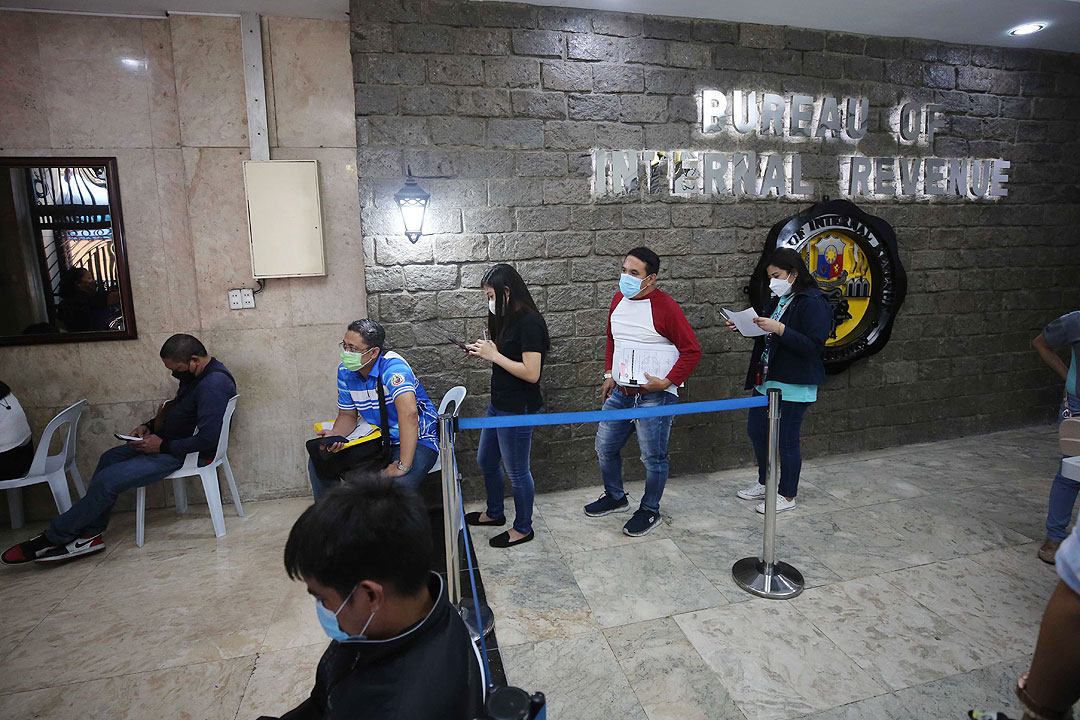
THE proposed Ease of Paying Taxes Act is expected to boost taxpayer compliance and increase government revenue, though the bill’s contradictory and outdated provisions need to be sorted out, analysts said.
“Simplifying tax procedures will help lower taxpayers’ costs in time, money, and mental distress. This will promote compliance that will eventually be helpful in raising money to fund strategic projects,” InvestEd Philippines Finance Executive Daniel C. Penkian said in a text message.
“Simpler taxation can improve compliance by reducing inadvertent non-payment of taxes. To some extent, taxpayers are unable to comply with the regulations because of complexities, which could have been remedied if our tax laws are as simpler,” he added.
House Bill No. 4125, or the proposed Ease of Paying Taxes Act, amends sections of Republic Act No. 8424, otherwise known as the National Internal Revenue Code of 1997, as amended.
The bill, a priority measure of the administration, was passed by the House of Representatives in September and is currently pending at a Senate committee.
It aims to modernize tax administration and improve collection efficiency by encouraging proper and easy compliance at the least cost.
It also seeks to adopt best practices and replace antiquated rules such as restrictions on venue for filing and payment, while customizing policies for various types of taxpayer.
The Secretary of Finance, upon the recommendation of the Bureau of Internal Revenue (BIR) Commissioner, will also be granted the authority to overhaul or create new taxpayer classifications.
Current tax law only recognizes a single category grouping the largest taxpayers.
Large taxpayers are defined as establishments with VAT paid or payable of at least P100,000 for any quarter of the preceding taxable year; with excise tax paid or payable of at least P1 million for the preceding taxable year; with annual income tax paid or payable of at least P1 million for the preceding taxable year; or with withholding tax payment or remittance of at least P1 million for the preceding taxable year.
Froilyn P. Doyaoen-Pagayatan, tax counsel of Gorriceta Africa Cauton & Saavedra law offices, said that the proposed legislation of the basis for classification of taxpayers would make tax administration “contemporaneous with economic conditions and more uniform.”
“The proposal that taxpayers not classified as large or medium taxpayers are not required to withhold taxes would reduce the burden of tax compliance on these taxpayers, who will be allowed to focus on their operations. It would also allow the BIR to focus on large and medium taxpayers in the enforcement of withholding tax obligations,” she added.
“Classifying taxpayers into large, medium, and small based on the taxpayer’s capacity to comply with tax rules, the amount and types of taxes being paid, gross revenue, volume of transactions, wage and employment levels, and other economic and financial considerations is another form of efficiency,” Mr. Penkian added.
Mr. Penkian said that the bill’s plan to introduce a small and medium taxpayer classification and a corresponding BIR special unit will “improve service and tax administration for both.”
“Institutionalizing simplified tax returns and processes will significantly help smaller taxpayers as most of them don’t usually have the same level of resources (tax accountants, lawyers, pool of compliance staff) as compared with large taxpayers,” he added.
However, Ms. Doyaoen-Pagayatan noted that the criteria for large taxpayers was established over two decades ago and that “the foregoing threshold amounts would be low under present economic circumstances.”
“Hence, such criteria could lead to classification of taxpayers as large even if, considering their present economic capabilities, they would not be able or would find it difficult to fulfill the additional compliance requirements which are the consequences of being classified as large taxpayers, such as the obligation to withhold,” she added.
She also cited Revenue Memorandum Order (RMO) No. 17-2017, which classifies as medium-sized taxpayers the top 500 non-individual taxpayers of the 12 top revenue regions in terms of collection that satisfy the criteria for large taxpayers but have not been designated as such by the BIR Commissioner.
“It is clear that under RMO No. 17-2017, the classification of a taxpayer as medium depends largely on the collection performance of the revenue region where a taxpayer is registered. This leads to lack of uniformity and equity in the enforcement of tax rules as it is possible that a taxpayer, otherwise classified as medium taxpayer, would escape being classified as such simply because of its place of registration,” she said.
The proposed bill also introduces a Taxpayer’s Bill of Rights.
“This proposes the enumeration of additional fundamental rights to further promote fair treatment of taxpayers and put guardrails in place to protect them against wrongful assessments,” Mr. Penkian said.
Ms. Doyaoen-Pagayatan said the inclusion of the bill of rights is “laudable” but most items are “mostly abstractly stated that prosecution and conviction of Bill of Rights violators may be challenging.”
“The Bill of Rights seems to be more of policy statements than specific criminal acts,” she added.
The Ease of Paying Taxes Act also creates a Taxpayer’s Advocate Office.
“It is worthwhile to highlight that the Taxpayer’s Advocate Office is intended to be independent from the BIR though the plan was to have the office directly report to the BIR Commissioner. There may be an issue of independence if that is the case,” Mr. Penkian noted.
“With respect to the Tax Advocacy Office, its proposed function is to protect and promote the rights of taxpayers and to identify systemic problems in the BIR and propose solutions to address such problems. However, (the bill) proposes that the Tax Advocacy Office shall report directly to the BIR Commissioner. The power and control of the BIR Commissioner over the Tax Advocacy Office may affect the independence and objectivity of the latter in the performance of its functions,” Ms. Doyaoen-Pagayatan added.
The bill also allows taxpayers to file returns or pay taxes anywhere, particularly with any authorized agent bank, Revenue District Office (RDOs), or collection agent, except in cases specified by the commissioner.
“The bill will further reduce the burden of paying taxes and will provide protection to the taxpayers. Reducing the burden means the taxpayers can pay taxes in RDOs and banks outside the principal place of business, removing the restrictions on payment venue, which will be easier for the taxpayers to comply with,” Res Werkes Phils., Inc. Chief Financial Officer Jonathan Q. Sibug said in an e-mail.
Mr. Penkian said that this will also “greatly help taxpayers save time in declaring and paying their dues resulting in flexibility and efficiency.”
“It’s about time that we remove the requirement that taxes must be paid in the BIR offices or banks within the jurisdiction of the taxpayer’s legal residence, principal place of business or principal office. Companies are highly concerned about the customer experience; so the government should be concerned about the taxpayer-experience,” he added.
Ms. Doyaoen-Pagayatan added that if the bill were passed and tax payments are allowed anywhere, this would “significantly lighten the burden of tax compliance especially for taxpayers that are not large or medium taxpayers.” — Luisa Maria Jacinta C. Jocson



